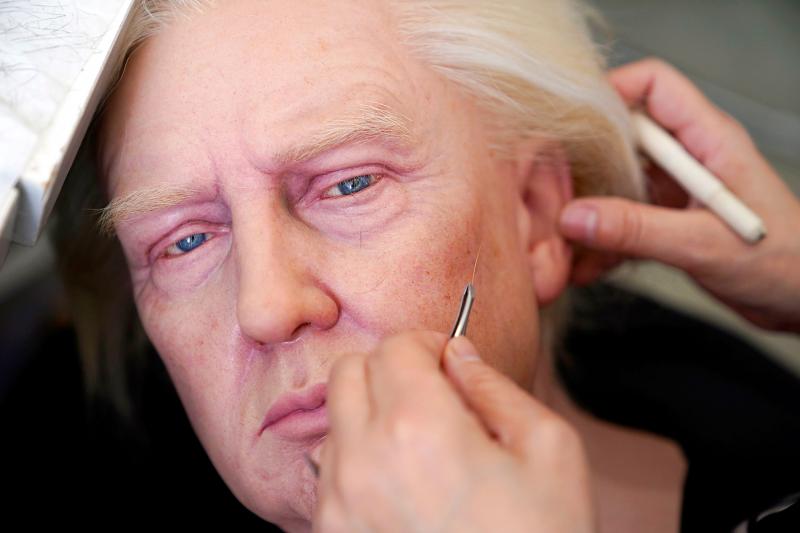For Zeng Sheng, the manager at Shanghai Maiyi Arts, this autumn should have been a boon for business: With the US presidential election, demand for the center’s wax replicas of US President Donald Trump should have been off the charts.
Instead, the spread of COVID-19 has halted new orders and stalled overseas travel, including to and from the US. He is now holding off on producing a replica of former US vice president Joe Biden, the Democratic Party presidential candidate.
“Tourist sites, amusement parks, houses of famous people are temporarily not open,” Zeng said. “Since they can’t resume work, we can’t get new orders.”

Photo: Reuters
Shanghai Maiyi Arts was founded in 2012 as a manufacturer and supplier of wax figures.
Located in the outskirts of Shanghai, about an hour’s drive from the city center, its exhibition hall also doubles as makeshift museum, where guests can pose next to replicas of North Korean leader Kim Jong-un, martial arts star Jackie Chan (成龍) and others.
Zeng said that by last year, the company was shipping up to 700 figures annually to customers, with about one-third going overseas.
However, the virus hit orders twice: first in China, when factories and tourist sites closed, and then overseas.
Business remains about two-thirds its normal size, Zeng said.
Zeng said that the hardest part of making a replica is the face.
It can take a month alone to design and sculpt perfect features.
The company uses specialists to make a replica’s hair and clothing. It can take three months to bring a figure to fruition, from start to finish.
Although Trump is the company’s best-selling model in the US, in China, the top seller is something closer to home: a replica of a security guard, asleep and slumped in a chair, brings in the most orders.
Last year the shop produced 16 Trump wax statues, six of which went abroad.

Former Nicaraguan president Violeta Chamorro, who brought peace to Nicaragua after years of war and was the first woman elected president in the Americas, died on Saturday at the age of 95, her family said. Chamorro, who ruled the poor Central American country from 1990 to 1997, “died in peace, surrounded by the affection and love of her children,” said a statement issued by her four children. As president, Chamorro ended a civil war that had raged for much of the 1980s as US-backed rebels known as the “Contras” fought the leftist Sandinista government. That conflict made Nicaragua one of

BOMBARDMENT: Moscow sent more than 440 drones and 32 missiles, Volodymyr Zelenskiy said, in ‘one of the most terrifying strikes’ on the capital in recent months A nighttime Russian missile and drone bombardment of Ukraine killed at least 15 people and injured 116 while they slept in their homes, local officials said yesterday, with the main barrage centering on the capital, Kyiv. Kyiv City Military Administration head Tymur Tkachenko said 14 people were killed and 99 were injured as explosions echoed across the city for hours during the night. The bombardment demolished a nine-story residential building, destroying dozens of apartments. Emergency workers were at the scene to rescue people from under the rubble. Russia flung more than 440 drones and 32 missiles at Ukraine, Ukrainian President Volodymyr Zelenskiy

COMPETITION: The US and Russia make up about 90 percent of the world stockpile and are adding new versions, while China’s nuclear force is steadily rising, SIPRI said Most of the world’s nuclear-armed states continued to modernize their arsenals last year, setting the stage for a new nuclear arms race, the Stockholm International Peace Research Institute (SIPRI) said yesterday. Nuclear powers including the US and Russia — which account for about 90 percent of the world’s stockpile — had spent time last year “upgrading existing weapons and adding newer versions,” researchers said. Since the end of the Cold War, old warheads have generally been dismantled quicker than new ones have been deployed, resulting in a decrease in the overall number of warheads. However, SIPRI said that the trend was likely

‘SHORTSIGHTED’: Using aid as leverage is punitive, would not be regarded well among Pacific Island nations and would further open the door for China, an academic said New Zealand has suspended millions of dollars in budget funding to the Cook Islands, it said yesterday, as the relationship between the two constitutionally linked countries continues to deteriorate amid the island group’s deepening ties with China. A spokesperson for New Zealand Minister of Foreign Affairs Winston Peters said in a statement that New Zealand early this month decided to suspend payment of NZ$18.2 million (US$11 million) in core sector support funding for this year and next year as it “relies on a high trust bilateral relationship.” New Zealand and Australia have become increasingly cautious about China’s growing presence in the Pacific